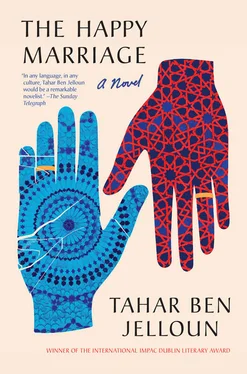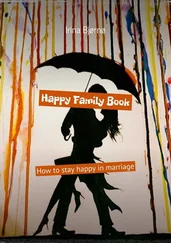I saw my parents twice over the course of three years. They came to bring me my share of oil and honey that my cousins had distributed amongst the villagers.
One day, my new parents told me that they had to return to France. We went to the bled. I felt weird, as though I were a stranger in that village that was devoid of water. There were children covered in flies playing with a dead cat. They had snotty noses and nobody was looking after them. My father came out to meet me, and I thought he was going to kiss me like my foreigner parents did, but instead I was the one who had to kiss the back of his large hand that smelled like dry earth. Without looking me in the eye, he told me: “We’ll see one another again someday, my daughter.” Then he spoke to me about a trip and papers that had to be signed. I saw bundles of banknotes being exchanged between the French couple and my father. I suddenly understood what had happened. My father had sold me! It was dreadful! I started to cry. The lady consoled me. She told me that my father would always be my father. They hadn’t been able to adopt me, so they’d needed a letter from my father so that I could leave with them. That’s how I got my first passport. It was green. The man from the wilaya told me in a menacing tone: “Be careful, this is valuable, if you lose it we won’t give you another one, and you’ll spend the rest of your life without a passport and you won’t be able to go anywhere.” When I was about to leave the office, the same man grabbed me and whispered in my ear: “You’re lucky that these Frenchmen are looking after you, so make sure you don’t embarrass us. Don’t forget that this little green booklet means you are representing Morocco!” But he was wrong, I wasn’t representing anyone, not even my mother, who’d stood motionless while she watched me leave. Maybe she cried too. I shut my eyes and decided I would never think about that unhappy village ever again.
A few weeks later, I left with the French couple in a ship bound for Marseilles. They didn’t speak throughout the entire journey. They were in a bad mood. The woman cried in secret. She told me that she didn’t want to leave that wonderful country but that her husband had to go back to look after his parents, who were old and ill. I told myself that he was a good son. But there was something else that was wrong with this couple who had never managed to have children. I could feel things even though I wasn’t able to call them by their names. They would argue over trifles. The woman wanted to be in charge and her husband would resist her, while I would watch them and remember that my parents had never raised their voices.
We went to live in an apartment that wasn’t very big. Our neighbors, who were Armenians, came to welcome us and brought us marzipan cakes. They had a daughter who was very beautiful, tall and with brown hair. She was seventeen years old even though she looked like she was in her twenties. She quickly became my friend. She often invited me over so she could show me photos that people had taken of her. She wanted to become an actress. “And what about your studies?” I asked her.
“You don’t need to study to become an actress!” she replied, laughing. She already worked as a fashion model and had been fairly successful. As we were the same size, she told me: “You know, if your parents agree, maybe you should try your luck too. People are interested in girls like us now and it’s our turn to become famous. Never cut your hair, instead let it grow and get it blown up, so you’ll look like a lioness!”
I thought that was funny. I loved my hair and took good care of it, I used henna that gave it a nice red color with brown highlights. My friend then undressed herself, asked me to do the same, and started comparing our measurements: waist, chest, and hips. She said that if I wanted to, I could be a big hit in the fashion world.
I attended high school and took my studies seriously. My Moroccan parents had simply disappeared, whereas my French parents were often nostalgic for Morocco. Then a bunch of their time was sucked up by a complicated drama over their inheritance after my French father’s parents died. For the most part, they gave me a lot of freedom and their absolute trust. I would take advantage of this and accompany my Armenian friend to her fashion shoots. That’s how a guy with red hair asked me to walk in front of him as though I was carrying a jug full of water on my head. I tried to picture what that might look like and walked carefully. “Watch out,” he shouted, “the jug’s going to fall and shatter into a thousand pieces!” So I took a deep breath and walked normally. A woman took me by the hand, undressed me, and told me to put on a weird dress that was full of holes. In fact it was see-through. I didn’t want to wear this dress that made me look like I was naked. So she gave me another dress that was more presentable and told me to walk around the room.
In the space of a few moments, I had become a model at the mere age of seventeen and a half! An exceptionally good job that meant I left each shoot with armloads of presents. My parents turned a blind eye to all of this. On one condition: that I wouldn’t fail my final exams. I didn’t listen to their advice and in June I was forced to take remedial classes. It was a slap in the face. I’d never thought of myself as a poor student. I hadn’t realized how many significant gaps there were in my learning. I was so arrogant that I thought I’d be able to catch up in no time. After all, it wasn’t my fault that I’d had such a chaotic and troubled education. I didn’t even know who I was anymore! Was I Lahbib Wakrine’s daughter, or did I belong to Mr. and Mrs. Lefranc? Was I Arab or Berber? French or Belgian? Mrs. Lefranc had Flemish roots …
I attended my remedial classes and managed to barely pass my exams. My French parents had nothing to say in that regard. I enrolled at the university, but never set foot there. I preferred to waste my time on far more futile endeavors and went to photo shoots. I was an adult by then and I didn’t realize how time was slipping through my fingers.
Although I’m not exactly sure as to how it happened, my Armenian friend got herself sucked in by a producer and featured in some explicit scenes in movies that were never shown in Marseilles’s bigger cinemas. She got into a big argument with her parents and disappeared. That drama made me snap out of my waking dream. I left that filthy scene behind and started taking my art history course seriously.
But all of a sudden, from one day to the next, I found myself on my own. My French parents wound up separating, and I barely noticed, since truth be told I’d been spending so little time at the house. They divided up all their possessions and I got caught in the middle. Mrs. Lefranc asked me if I wanted to go live with her or stay with her ex-husband. I was embarrassed. But as luck would have it, everything worked out: a court decree authorized my right to family reunification. My father, who’d set himself up in Clermont-Ferrand, sent for his wife and two of his other children. Forgetting all the sadness I’d suffered in the past and the pain I’d felt when I was abandoned, I suddenly felt the urge to join them. The botched adoption had merely been an interlude that had allowed me to have a fairly normal education. My parents were still my parents. My name was Amina Wakrine even though the Lefrancs called me Nathalie. As it happens, I never figured out why they’d chosen that name. At school, everyone had called me Natha. As for the guy with red hair, he wanted to call me Kika. And why not? My name seemed to change all the time, but I was still the same person, my parents’ daughter.
Once I got to Clermont-Ferrand, I felt like I was having a panic attack. That city felt like a prison to me. It was ugly, gray, and stifling. I wanted so badly to leave it and never return. Seeing my distress, my father decided not to say anything and allowed me to leave for Paris so that I could continue the studies I’d begun in Marseilles. He opened a bank account for me and deposited some of the money that the French couple had given him. It was a considerable sum, especially since it had been supplemented by the money orders that Mrs. Lefranc had been sending me ever since she’d gotten divorced. Leaving for Paris was a turning point for me. I was finally independent and free of all the guilt I’d ever felt toward my parents. I was determined to make the best of it. I would never have dreamed at that time of the monumental failure that would await me with the painter many years later.
Читать дальше












